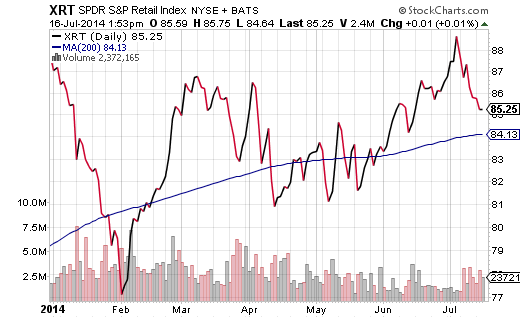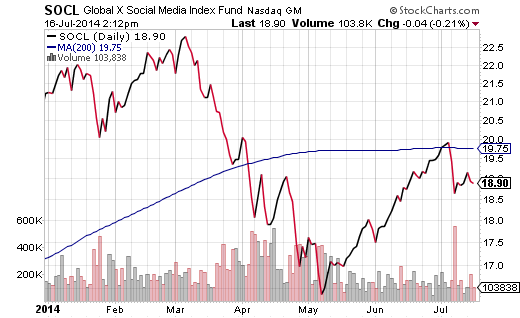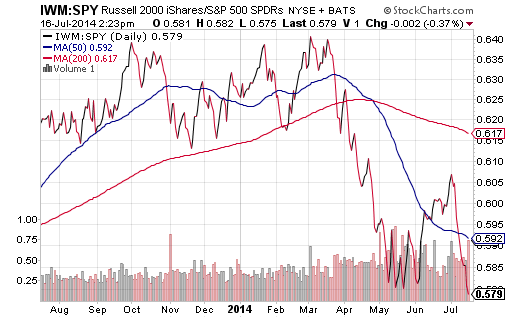There has been a great deal of talk about the housing recovery. Sales of existing homes steadily rose between mid-2011 and mid-2013 on the back of a weak U.S. dollar and an increase in the money supply. Indeed, Federal Reserve monetary policy had stimulated demand for U.S. stocks as well as U.S. real estate. Yet from the moment the Fed announced its intention to pull back on its unconventional program of creating electronic dollars to buy U.S. bonds, property sales began to slide alongside rising interest rates.
Since January of this year, however, the 10-Year yield has reversed direction, from a high of 3.03% back down to 2.53%. The 50-basis point move has provided a boost to actual sales in the 2nd quarter as well as a lift to home-builder sentiment. On the other hand, sales are still 20%-25% lower than they were at their peak and they have already been slowing in “hot markets” like Southern California. Year over year, Los Angeles and San Diego have experienced declines in home sales of 12% and 19% respectively.
From the data that I am looking at, it is difficult to see how real estate will contribute significantly to economic growth. For that matter, the consumer has not been spending at retailers or buying residential properties, challenging the notion that Main Street is feeling confident about the current expansion. The fact that SPDR S&P Homebuilders (NYSE:XHB) as well as SPDR S&P Retail (NYSE:XRT) are negative in 2014 reflect this economic uncertainty.

“Come on, Gary,” you argue. “The economy must be on solid footing or the Dow and the S&P 500 would not be hitting all-time highs.” I respectfully disagree. Not only is the remarkable performance of long-term U.S. Treasuries in 2014 highlighting weaknesses – not only did the Bank of International Settlements (BIS) describe euphoric asset prices as being out of touch with global economic reality – but even Federal Reserve Chairwoman Janet Yellen discussed the feverish valuations of sectors like biotech and dot-com/social media. Biotech has held up better than social media on the year, though both areas have been remarkably volatile as of late.

Granted, Chairwoman Yellen did not describe the market at large as “irrationally exuberant.” She even went out of her way to describe mainstream stock assets as being in line with historical norms. Still, what is she supposed to say? Is she supposed to explain that her central bank’s monetary policies have pushed stocks to price-to-sales, price-to-book, and cyclical price-to earnings levels rarely seen except at bull market tops?
On the whole, U.S. stocks are severely overvalued. Even the market itself knows it. The iShares Russell 2000 (ARCA:IWM)):S&P 500 SPDR Trust (ARCA:SPY) price ratio (IWM:SPY) demonstrates the extraordinary weakness of small company shares as they relate to large companies. Moreover, small-cap stocks typically lead the way when investors believe in the strength of an economic expansion. Yet U.S. small-cap stocks via IWM have registered negative returns for 2014. That’s a far cry from the celebratory atmosphere surrounding the mighty S&P 500.

It’s not just small caps in the Russell 2000 that are struggling. The smallest corporations in the iShares Russell Microcap Index (NYSE:IWC) have been losing steam as well. The iShares Russell Microcap Fund is negative year-to-date and the current price sits below a long-term 200-day trendline.

So why are small caps and smaller caps having such a difficult time? First and foremost, the stock market boom has largely tracked the increase in the money supply since 2009. The 10%-20% corrections that occurred between 2009-2011 did so when the Fed briefly exited the dollar creation/rate manipulation game. With the Fed ending its third iteration of quantitative easing (QE3) near the end of 2014, smaller companies look particularly vulnerable; the U.S. economy has yet to show that it can sustain itself without the Fed’s unconventional bond purchases or “bond twists.”
Second, smaller companies that increased their leverage by borrowing at ultra-low rates to finance share acquisition are more susceptible to balance sheet fears than larger corporations. Indeed, the data already indicate that corporations have been slowing the pace at which they buy back their own stock. Now add valuation concerns to the mix. It is unlikely that executives at any company would brazenly continue to repurchase shares at exorbitant prices. As the artificial demand for shares of small companies dissipates, the price depreciation could get ugly.
Finally, Janet Yellen’s Fed may not be able to kill small-cap speculation with words alone. Yet the specific “calling out” of smaller companies in the biotech and social media space has shown signs of spreading across all small-cap company stock ETFs. If it is true that bull markets infrequently last beyond five years – and if Fed quantitative easing (QE3) does run its course this year – the least one should do is play the tuba rather than the flute. Small-cap fans can always reevaluate the landscape, particularly if they are treated to QE4 and QE5.
Disclosure: Gary Gordon, MS, CFP is the president of Pacific Park Financial, Inc., a Registered Investment Adviser with the SEC. Gary Gordon, Pacific Park Financial, Inc, and/or its clients may hold positions in the ETFs, mutual funds, and/or any investment asset mentioned above. The commentary does not constitute individualized investment advice. The opinions offered herein are not personalized recommendations to buy, sell or hold securities. At times, issuers of exchange-traded products compensate Pacific Park Financial, Inc. or its subsidiaries for advertising at the ETF Expert web site. ETF Expert content is created independently of any advertising relationships.
